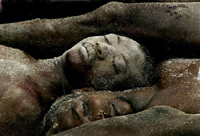Truth comission visits mass graves in Liberia

Liberia’s Truth and Reconciliation Commission vowed to help villagers with burring their relatives’ bodies during its visit to the mass graves of people massacred during the country's 14-year civil war.
Commission chairman Jerome Verdier said Tuesday he headed a team that visited four villages this week in Lofa County, which was known as Liberia's bread basket before the war and changed hands many times during the fighting.
"In those towns, some of the survivors narrated horrible and gruesome stories of the atrocities committed against them by various warring factions during the Liberian conflict which caused some listeners to shed tears," Verdier's commission said in a statement.
The team had gone to the villages to encourage residents to share their stories and was led to the graves.
The smallest grave is believed to hold 78 people, while the largest has as many as 500 bodies, said Verdier.
"Liberians are prepared to say the truth of what happened," Verdier said. "And Liberians are prepared to put the past behind."
"The mass graves that we saw are something the people are living with," Verdier said. "In some places, they have the full names of those who were buried."
Verdier said villagers told his team they wanted the bodies exhumed and reburied. He said while that was not his commission's role, it would try to help. While Liberia is rich in natural resources, its government and most of its people were impoverished by the years of war and lack the money and expertise for mass exhumations.
Liberia's truth commission, patterned after a similar commission established in 1995 to examine human rights abuses in South Africa, offers victims an opportunity to air their grievances and create a historical record. It cannot conduct criminal trials, but can recommend that some people be prosecuted.
The presence of mass graves in Liberia is well-documented, says Corinne Dufka, the Human Rights Watch senior researcher for West Africa and an expert on Liberia.
"I myself documented several group killings," she said. "I would say the local population already knew about these graves" but the confirmation of the truth commission now makes it official.
The United Nations has set out a detailed protocol to deal with exhuming human remains, she says. Now that the graves are in the public eye, steps can be taken to begin that protocol, which involves isolating the site and performing DNA tests to identify bodies.
Dufka called Lofa County, the area the commission visited, "an epicenter of both military activity and human rights abuses."
Few of this West African country's 3 million people have been untouched by violence. Some 250,000 Liberians are believed to have been killed in the fighting between 1979 and 2003, when former President Charles Taylor bowed to international pressure and went into exile. He is now imprisoned in The Hague, Netherlands, awaiting trial on charges of war crimes and crimes against humanity.
Subscribe to Pravda.Ru Telegram channel, Facebook, RSS!


